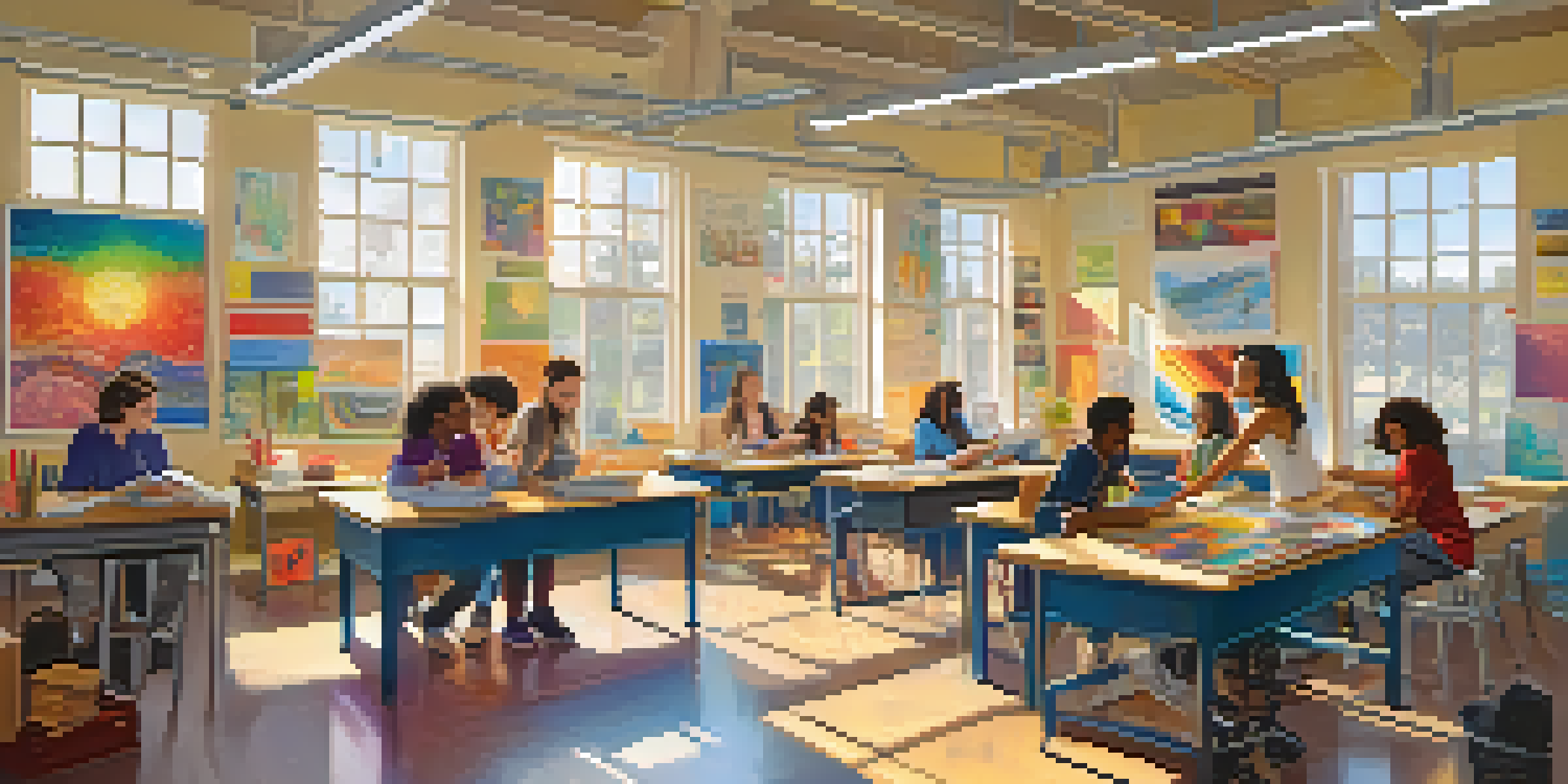The Importance of Interdisciplinary Skills in Modern Education

Understanding Interdisciplinary Skills in Education
Interdisciplinary skills refer to the ability to integrate knowledge from multiple disciplines. In an increasingly complex world, these skills allow students to connect concepts and ideas across varying fields. For instance, a project combining science and art can enhance creativity while solidifying scientific principles.
Education is not the filling of a pail, but the lighting of a fire.
These skills are essential in addressing real-world problems, which often don't fit neatly within a single subject area. Students learn to think critically and apply their knowledge in practical situations, making education more relevant and impactful. As industries evolve, employers increasingly seek individuals who can navigate and synthesize information from diverse disciplines.
By fostering interdisciplinary skills, educators can prepare students for the challenges they will face in the workforce. This approach to learning not only makes education more engaging but also cultivates a generation of innovative thinkers capable of tackling multifaceted issues.
The Role of Collaboration in Interdisciplinary Learning
Collaboration is at the heart of interdisciplinary education. When students work together on projects that span multiple subjects, they learn to communicate effectively and appreciate different perspectives. For example, a team of students might collaborate on a project that incorporates elements of math, history, and environmental science, broadening their understanding of each field.

These collaborative experiences also mimic real-world work environments, where teamwork is essential. Students learn to negotiate, share responsibilities, and bring unique strengths to the table, skills that are invaluable in any career. By working together, they not only build interpersonal skills but also foster a sense of community and mutual support.
Interdisciplinary Skills Matter
Integrating knowledge from multiple disciplines prepares students for real-world challenges and enhances their creativity.
Moreover, collaboration encourages creativity and innovation. When diverse minds come together, they can brainstorm unique solutions and approaches that one individual might not consider. In this way, interdisciplinary projects can lead to groundbreaking ideas that benefit society as a whole.
Enhancing Critical Thinking Through Interdisciplinary Studies
Critical thinking is a vital skill that students develop through interdisciplinary studies. By engaging with multiple subjects, they learn to analyze information from various angles, improving their ability to evaluate arguments and evidence. This multifaceted approach not only sharpens their reasoning but also equips them to make informed decisions.
The future belongs to those who learn more skills and combine them in creative ways.
For instance, a student studying climate change might explore its scientific, economic, and social implications. This comprehensive examination encourages them to think critically about the interconnectedness of these issues and consider solutions that address them holistically. This depth of understanding is crucial in today’s complex world.
As students practice critical thinking, they also become more adept at problem-solving. They learn to identify challenges, consider alternatives, and implement solutions, preparing them for both academic and professional success. Ultimately, interdisciplinary education cultivates thinkers who can navigate uncertainty and complexity with confidence.
Preparing for the Future Job Market with Interdisciplinary Skills
The job market is evolving, with employers increasingly seeking candidates who possess interdisciplinary skills. Today's challenges require individuals who can adapt and apply knowledge from various fields, making them more versatile and valuable in the workplace. For example, roles in technology often demand a blend of programming, design, and communication skills.
By integrating interdisciplinary learning into education, schools can better prepare students for these demands. Courses that combine science, technology, engineering, arts, and mathematics (STEAM) are particularly effective in fostering a diverse skill set. This approach not only enhances employability but also encourages lifelong learning, as students become accustomed to navigating different fields.
Collaboration Enhances Learning
Working together on interdisciplinary projects fosters communication, teamwork, and innovative problem-solving skills.
Furthermore, interdisciplinary skills empower students to be innovative leaders in their chosen careers. They are equipped to approach problems creatively, collaborate across disciplines, and lead projects that require a multifaceted understanding. In this way, interdisciplinary education not only prepares students for jobs but also for roles that drive progress and change.
Engaging Students with Real-World Applications
One of the most compelling aspects of interdisciplinary education is its focus on real-world applications. When students see how their learning connects to current events or societal issues, they become more engaged and motivated. For instance, examining local environmental challenges can illustrate the importance of science, policy, and community action.
These real-world connections help students understand the relevance of their education. They begin to see the direct impact of their studies on their lives and communities, fostering a sense of responsibility and empowerment. This engagement not only enhances learning but also encourages students to think critically about the world around them.
Moreover, by addressing real-world problems, interdisciplinary education promotes civic engagement. Students learn to recognize their role in society and understand how they can contribute to positive change. This focus on practicality ensures that education goes beyond textbooks, preparing students for active participation in their communities.
The Importance of Flexibility in Interdisciplinary Learning
Flexibility is a key component of effective interdisciplinary education. As students encounter various subjects, they must adapt their thinking and approaches to different contexts. This adaptability not only enhances their learning experience but also prepares them for the dynamic nature of today’s world.
In an interdisciplinary setting, students often face challenges that require them to pivot their strategies. For example, a project that starts in the realm of science may shift to include economic considerations as they progress. This fluidity encourages them to remain open-minded and responsive to new information and perspectives.
Flexibility is Key in Education
Adapting to various subjects and contexts helps students develop resilience and prepares them for a dynamic job market.
Furthermore, fostering flexibility helps students develop resilience. When they encounter setbacks or obstacles, they learn to adjust their plans and explore alternative solutions. This mindset is invaluable in both academic pursuits and future careers, where adaptability is often a key to success.
Cultivating Lifelong Learners Through Interdisciplinary Education
Interdisciplinary education plays a crucial role in cultivating a culture of lifelong learning. By encouraging curiosity and exploration across various subjects, students develop a passion for knowledge that extends beyond the classroom. This love for learning is essential in a rapidly changing world where new information and skills are constantly emerging.
When students engage in interdisciplinary projects, they often discover interests they may not have explored otherwise. A student who initially focused on mathematics might find a newfound appreciation for art when tasked with a project that combines both disciplines. This exploration fosters a sense of agency and encourages them to pursue knowledge independently.

Ultimately, fostering lifelong learners is about equipping students with the tools they need to navigate a complex world. Interdisciplinary education not only prepares them for immediate challenges but also instills a mindset that values continuous growth and adaptation. This approach ensures that students are not just prepared for their next exam but for a lifetime of learning.